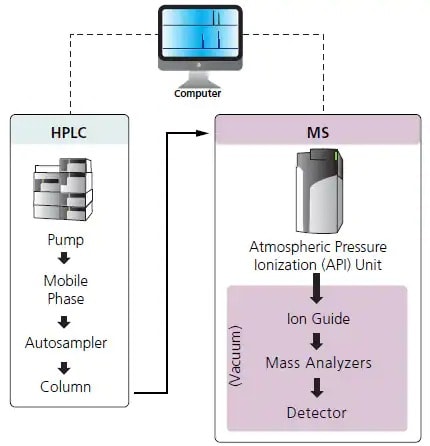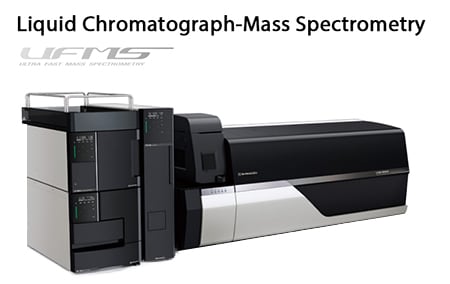Liquid Chromatography Mass Spectrometry (LC/MS) Instrumentation
What is LC/MS?
Liquid Chromatography Mass Spectrometry (LC/MS) is an analytical technique that combines liquid chromatography (LC) with mass spectrometry (MS). It enables both quantitative and qualitative analysis in fields such as pharmaceuticals, food science, and environmental testing.
Basic Components of an LC System

Figure 5. Basic components of a LCMS system.
The basic components of a LC unit consist of:
- (1) Pump - delivers the mobile phase at a required flow rate,
- (2) Autosampler - injects the samples,
- (3) Column - for separation of sample,
- (4) Detector - for the analysis of the separated components in a sample.
-
Instrumentation of an LC/MS System
For a LCMS system (Figure 5), the instrumentation comprises of:
- (1) a LC unit,
- (2) an interface between the LC and MS,
- (3) an ion source that ionizes samples (e.g. API unit),
- (4) an ion guide (an electrostatic lens that efficiently introduces the generated ions into the MS,
- (5) a mass analyzer unit that separates the ions based on their mass-to-charge (m/z),
- (6) a detector unit that detects the separated ions.
Examples of common MS detectors are electron multiplier and microchannel plate (MCP) where they operate by the secondary electron emission process.
Together with the LC chromatogram, the quantity of ions that reach the detector is converted to a signal intensity and output to a computer.
The ion guide, mass analyzer and detector are all housed in a vacuum in the MS. By holding it in a vacuum, the generated ions are able to be introduced, analyzed and detected in the MS with minimal collision and loss.
Advanced Configurations: 2D-LCMS and Multidimensional Chromatography
Besides the conventional LC which utilizes only one chromatography technique and column, there is the multi-dimensional chromatography which uses a combination of techniques (e.g. separation modes and/or columns) for separation. One such system is the two-dimensional LC (2D-LC) which can achieve higher selectivity not possible with conventional LC alone. There are various setups (e.g. online and offline) for multidimensional LC and it can be coupled to a MS to give a 2D-LCMS. The use of 2DLC in analyses can serve as a clean-up and pre-concentration step in a trap-and elute system. Another setup, a trap-free 2D-LCMS/ MS system, can allow the easy switch of involatile to compatible mobile phases for detection using MS.
2D-LC setups can:
- Act as a clean-up and pre-concentration step (trap-and-elute systems)
- Allow mobile phase switching for MS compatibility in trap-free 2D-LCMS/MS systems
FAQ
What are the main components of an LC/MS instrument?
An LCMS instrument typically consists of a liquid chromatograph (LC), an interface to connect the LC to the MS, an ion source to ionize the sample, an ion guide for efficient ion transfer, a mass analyzer to separate ions by m/z, and a detector that records signal intensity for analysis.
Why is vacuum used in the mass spectrometer (MS) section?
The ion guide, mass analyzer, and detector are all housed in a vacuum within the mass spectrometer. This vacuum environment reduces ion collisions and energy loss, ensuring that the ions are efficiently introduced, analyzed, and detected with high accuracy. It plays a crucial role in maintaining sensitivity.
What is the advantage of 2D-LCMS compared to conventional LC systems?
2D-LCMS combines two chromatography modes to improve separation selectivity. It enables better cleanup and pre-concentration of samples, or switching mobile phases for MS compatibility. This setup improves detection of complex samples where conventional LC may fall short.







